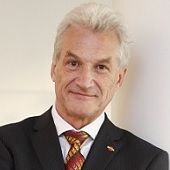Germany’s Gauck in China: Human Rights for Home Consumption
How the Chinese leadership manages to cottonball sensitive state visits.
March 24, 2016
This week brought an intriguing coincidence on the world stage: The presidents of two major Western countries each visited one of the two of the few remaining Communist countries in the world. U.S. President Barack Obama went to Havanna, Cuba, while Germany’s president Joachim Gauck visited Beijing.
Both visits were delicate affairs and demanded an adroit management of communications, albeit for different reasons.
Obama had to deal with plenty of potential pitfalls after decades of estrangement. But his communications challenge was much more pronounced on the home front, with conservatives being suspicious that Obama would cuddle up too much to the Castro Brothers.
From insider to insider
The challenge in Gauck’s case was quite the opposite: Here you have a former East German dissident who harbors no sympathies for Communism, but has inside knowledge, having lived under its yoke for decades.
The centerpiece of Gauck’s visit, like Obama’s, was a speech devoted in large part to human rights. There was a significant difference: Obama’s speech was transmitted on Cuba’s national television, while Gauck’s was not public.
Anti-Communism is a sentiment that Gauck shares with Germany’s Chancellor Angela Merkel (who also spent her formative years in East Germany). The autobiographies of both German leaders cause quite some apprehension in China.
That has not kept Merkel from becoming a close interlocutor of the Chinese leadership. Germany, not least owing to its close trade relationship with China, is China’s closest partner in Europe, a fact that is underscored by annual cabinet-level meetings between the two countries’ governments.
Gauck’s visit tells much about how China’s leaders manage the conflict of ideological differences and pragmatic necessities: They effectively cottonball all sensitivities.
To Gauck’s credit, he made a valiant effort to hold his own in dealing with the new world power. Alas, the political effect was miniscule. Such are the realities of the stringent discourse control in contemporary China.
It is no surprise then that Gauck, on his first-ever visit to China, trod with care. A state visit, with all the protocol that it entails, requires the visitor to engage in mellifluous public expressions of great “respect” and “sympathy” – in this case, for China’s development.
Gauck also made a point of highlighting Germany’s effort not just to expand the Western understanding of China, but also China’s comprehension of what drives a Western country’s China policy.
Speaking truth, forcibly in private
Yet, a former dissident turned president such as Gauck cannot — and would not wish to — discard his lifelong devotion to values such as individual freedom and democracy.
To bridge the gap, he held a private meeting with social activists and human rights lawyers and had an intense discussion about Marxism with China’s propaganda chief at the Party School.
Gauck also gave a speech at Tongji University in Shanghai in front of 100 selected students and university administrative staff.
Here, he referred to the “devastating” Cultural Revolution in China and expressed “concern” about problems of the environment, inequality and individual freedom in China. He also included this:
“Even if the universal applicability of human rights does not yet mean that every person can de facto enjoy those rights… they can nonetheless lay claim to them.”
A superb speech
For all his sincerity, and despite everything the man so well versed in Marxist doctrine and reality had to offer his hosts, Gauck’s visit showed how difficult it is to devise sensible ways of dealing with a China that is ever more conscious of its increasing political clout.
For a long time now, Beijing has developed its strategy to allow visitors intent on speaking about human rights to do so—mainly for their own public back home, and without much of the Chinese public knowing.
Not so co-incidentally, this is an experience that the other President engaged with a Communist country this week, Barack Obama, also made in Shanghai a few years back, in 2009 during a speech at Fudan University.
The Chinese are masters of dominating the protocol. Yes, they let Gauck give his speech, but with no leader present and unpublished in China.
In case you wonder, Prime Minister Li Keqiang made his statement “We are friends now” at the side of the German president, very much in public.
Never missing a beat, the CCP’s propaganda paper Global Times added its own pinch of scorn with its editorial: “Human rights not priority for Gauck visit.”
Takeaways
What happens when Germany’s President, who harbors no sympathies for Communism, visits China's leaders?
Beijing allows visitors to speak about human rights — mainly for their own public back home.
Gauck’s visit to China shows how it manages conflict between ideological differences and pragmatic necessities.
